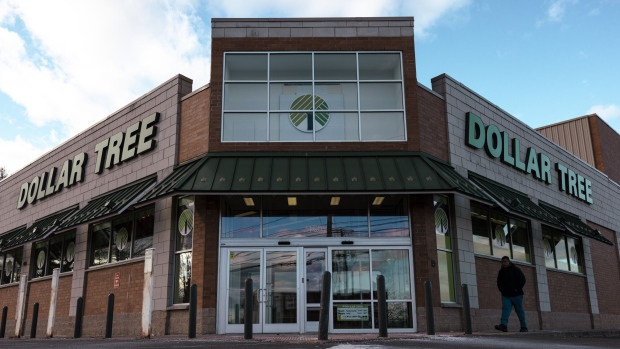Mar 13, 2024
The Daily Chase: Dollar Tree trimming stores, Nvidia keeps climbing
, BNN Bloomberg

Here are five things you need to know this morning:
Fraudsters cash in on Ozempic frenzy: The runaway success of weight loss drugs like Ozempic has been a sight to behold of late, pushing the valuations of the companies that make them into the stratosphere. Denmark-based Novo Nordisk, the maker of Ozempic and Wegovy, has ridden that wave to become the most valuable company in Europe, while U.S. based Eli Lilly hasn’t been far behind, worth just shy of US$1 trillion on the back of its version, Mounjaro. Given the massive market, it’s no surprise to learn that fraudsters want in on the boom. Bloomberg reports that police agencies are noticing an epidemic in bogus versions of the drugs, put out on to the black market by organized crime entities or simply small-scale entrepreneurial fraudsters. Some of the dupes are quite sophisticated and legitimate looking, while others are crude fakes with dangerous contents like insulin — a potentially lethal filling for a non-diabetic person. The British medicines agency says it has found 869 fake Ozempic pens so far, while the U.K. border agency has seized 369 on the way into the country. Agencies across Europe, the Middle East and the U.S. report similar finds, with users often ending up in hospital. The invisible hand of the market may be a good thing when it comes to ensuring healthy supply and demand of products for consumers, but when that hand delivers fake weight loss drugs to unsuspecting people, it’s clear the scale has been tipped into an unhealthy zone.
Opinions flipping on what inverted yields might mean: For decades, an inverted yield curve has been held as an early recession indicator because it has an uncanny track record of happening before one occurs. Prior to almost every recession since the Second World War, the yield on the U.S. government 10-year bond dipped below the yield on the two-year. Other gaps have similar predictive winning streaks, so when yields in many developed economies including Canada and the U.S. started inverting in recent years, prognosticators took notice. But in a poll of strategists conducted by Reuters published Wednesday, a majority now say the yield curve isn’t the predictor it once was, mostly because the unprecedented campaign of bond-buying by central banks has distorted the market. The spread between the 10-year and two-year mentioned above has been inverted for almost two years now, and yet the U.S. economy is showing few signs of recession, with GDP expanding at a healthy clip, the labour market adding jobs, and stock markets hitting record highs on a seemingly daily basis. It’s anyone’s guess what the future might bring, but when the professional economic soothsayers start saying ‘it’s different this time,’ I tend to listen.
Dollar Tree plans to weed out slumping stores: If there is a recession in the offing, signs of it are likely to show up in the financial results of companies like Dollar Tree, a U.S. chain that targets cost-conscious consumers with deep discounts. The chain has more than 16,000 locations across the U.S. and Canada, but in its earnings release on Wednesday, the company says it plans to close as many as 1,000 of them in the coming quarter. Same-store sales increased by three per cent and the company actually saw its profit increase for the first time in a year, but the chain says it plans to push ahead with closing a large number of stores for what it calls “underperformance.” Shares in the company are off by about 10 per cent in premarket trading on the news, but that comes after a rally of more than 40 per cent since October.
Nvidia rally continues: After a brief slip up at the end of last week where it looked like the party might be over, shares in semiconductor giant Nvidia continued their breathtaking rally on Tuesday, gaining more than seven per cent. At the company’s current valuation, it added about US$153 billion to its market cap in a single day — more than the entire valuation of major Canadian companies like TD Bank or Shopify are worth in their entirety. Based on premarket trading Wednesday, it’s on track to go up again today, adding to the company’s 85 per cent gain so far in 2024 and a more than tripling of its value since this time last year. Where does it end? It’s anyone’s guess, but “bubble” talk is starting to emerge due to just how fast things have moved here, and the historical parallels are not always kind. Wharton professor Jeremy Siegel wrote Wednesday that the company could be worth US$6 trillion one day soon if it follows the path set by companies like Cisco during the dot-com bubble. Claudio Chisani, a portfolio manager and investment advisor at Blueshore Financial was a guest on BNN Bloomberg’s The Street this morning, and he said whatever happens to Nvidia, other stocks riding the AI boom will go along for the ride. “If Nvidia sneezes, the sector could catch a cold,” he said.
Food price hubbub ignores 'sacred cow' of dairy: Much like “softwood lumber dispute” the words “dairy supply management” are seared into my business journalism brain, so I very much enjoyed this Canadian Press feature today on how in all the current brouhaha over high food prices, supply management in Canada’s dairy industry has somehow managed to avoid scrutiny once again. The system has been in place since the 1960s and the arguments in favour and against it haven’t changed much over the years, but it’s fascinating to watch the current national discourse underway about unprecedented food price inflation happen against the backdrop of the system in place for things like dairy and eggs. Read it for yourself and see.